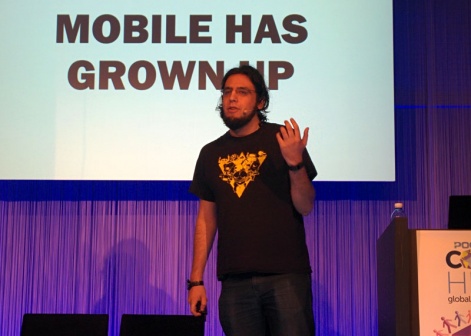Rami Ismail took to the stage at PGC Helsinki like an old friend blowing steam off a cup of coffee.
“How are you all doing,” he said fondly, “it’s been a while... We’ve been working on Nuclear Throne on Steam and Console for the past two years, so this really feels like coming back and catching up.”
Of course, his company Vlambeer made waves with Super Crate Box and Ridiculous Fishing. In their wake, Ismail quickly became a go-to authority in the mobile space and a regular to stages at conferences around the world.
Old face, new tricks
Coming back to Pocket Gamer Connects Helsinki, Ismail has a new perspective on the mobile industry.
“Mobile’s grown up hasn’t it? When we first started mobile was so new it was talked about as disruption, and now everyone is talking about disrupting the mobile industry.

“If you go out of the mobile space and come back, you don’t understand a single abbreviation. Before I left, we were talking about UA and ARPU. Sometimes I read Pocket Gamer.biz articles and it’s like reading a mathematical equation, it’s a different world with its own challenges.
Consequently, Ismail believes that our industry often takes the wrong approach to self-education. While mobile developers religiously take notes at GDC talks, scoff open blogs and constantly search for the latest nugget of wisdom, Ismail cautions the audience in Helsinki to be careful about what advice they take.
“Mobile gaming is a different sport,” he says. “GDC talks might not apply to mobile games – there’s PC, console and handheld games in the audience too.

Indeed, the problem is that each platform thinks the grass is greener on the other side. Growing numbers of developers are seeking to jump platform, or at the very least make a cross-platform game.
“It’s hard on mobile, but the reality is it’s hard on handheld, PC and Steam,” warns Ismail.
If you go out of the mobile space and come back, you don’t understand a single abbreviation.Rami Ismail
“On handheld it’s a lot less saturated than mobile, but it’s also a closed market. It’s a lot smaller, and harder to get your game published. PC feels open but really it isn’t – you have Steam, and that’s it. They’re all really hard spaces to fit in.
“A lot of mobile companies say they’re going to put their mobile games on PC, but PC manufacturers are saying ‘PC is really hard at the moment, so we’re heading to console’ and console guys are saying ‘console is too expensive, we’re heading to mobile’. The worst thing about that is it costs. You can’t just take mobile developers and drop them in a pc world and it works. Just bringing your mobile game to PC doesn’t work.”
Peering over the fence
He says that while a lot of devs think mobile is a good place to start, it’s not.
“If you’re making your first game in mobile it’s going to be really hard to get attention. You have to make a good game, and then you have to flip 4000 coins and they’re all heads you’ll do well.”
Still, Ismail is hopeful. Ten years ago people were giving “the end is nigh talks,” and in ten years’ time they still will be, but the industry will keep finding success. It’s exciting, fast-moving, fascinating, and still young.
Rather than focussing on the negative, Ismail encourages the audience to look at untapped markets like VR, but also to not try to directly copy successes that came before.
The reasons behind past successes “worked when they worked, but they might not work now. It’s still useful – find the trends, but don’t read them as truth. They’re one truth from a while ago, but today is not a while ago.
“A lot of Crossy Road is inspired by Flappy Bird, but not by Flappy Bird, by the ideas behind Flappy Bird,” he says. In other words, don’t clone but build on the same foundations as games you admire.
“Go to talks and don’t listen to them – flat out ignore everything everyone says,” Ismail advises cheerily.
“Take the information, and build a new framework in their head. People on stage are people that had a success, but that hard work was also helped by luck and timing. The industry is not in a spot where it’s worth worrying about, we’re not doomed.”





















